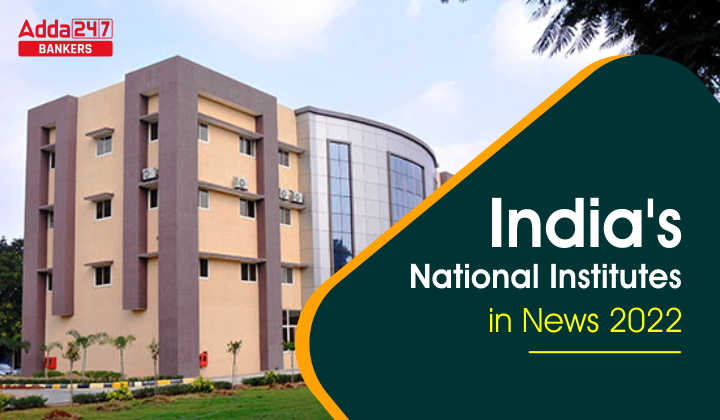Hello Students !
In General Awareness section, there is a static portion also asked by the examiner. But one needs to study static portion in respect to current news. For example, National Investigation agency was in news, So one should have a brief knowledge about the institution. In this article we are providing the list of the institute which were in news.
National Investigative Agency(NIA)
- It was constituted under the National Investigation Agency (NIA) Act, 2008.
- The agency is empowered to deal with the investigation of terror related crimes across states without special permission from the states under written proclamation from the Ministry of Home Affairs.
- Headquarters: New Delhi
- The founding Director-General of NIA was Radha Vinod Raju. Currently Dinkar Gupta serves as its Director-General since 28 June 2022.
- At present NIA is functioning as the Central Counter Terrorism Law Enforcement Agency in India.
- It investigate all the offences affecting the sovereignty, security and integrity of India. It includes:
- Friendly relations with foreign states.
- Against atomic and nuclear facilities.
- Smuggling of arms, drugs and fake Indian currency and infiltration from across the borders.
- The offences under the statutory laws enacted to implement international treaties, agreements, conventions and resolutions of the United Nations, its agencies and other international organisations
Central Bureau of Investigation
- It functions under Dept. of Personnel, Ministry of Personnel, Pension & Public Grievances, Government of India, is the premier investigating police agency in India.
- It is also the nodal police agency in India, which coordinates investigation on behalf of Interpol Member countries.
- Director general : Subodh Kumar Jaiswal
- The CBI is not a statutory body but derives its power to investigate from the Delhi Special Police Establishment Act, 1946.
- The establishment of the CBI was recommended by the Santhanam Committee on Prevention of Corruption (1962–1964).
- It investigate serious crimes related to defence of India, corruption in high places, serious fraud, cheating and embezzlement and social crime, particularly of hoarding, black-marketing and profiteering in essential commodities, having all-India and inter-state ramifications.
National Crime Records Bureau
- NCRB, headquartered in New Delhi, was set-up in 1986 under the Ministry of Home Affairs to function as a repository of information on crime and criminals so as to assist the investigators in linking crime to the perpetrators.
- Major Publications:
- Crimes in India
- Accidental Deaths and Suicides
- Prison Statistics
- Reports on Missing Women and children in India
- It was recommended by Tandon Committee, National Police Commission (1977-1981) and the MHA’s Task force (1985).
- NCRB is entrusted with the responsibility for monitoring, coordinating, and implementing the Crime and Criminal Tracking Network & Systems (CCTNS) project.
- Head: Vivek Gogoi
Central Drugs Standard Control Organisation(CDSCO)
- It is under Directorate General of Health Services, Ministry of Health & Family Welfare, Government of India, is the National Regulatory Authority (NRA) of India.
- Dr. V. G. Somani, Drugs Controller General of India
- Headquarters: New Delhi
- The Drugs & Cosmetics Act,1940 and rules 1945 have entrusted various responsibilities to central & state regulators for regulation of drugs & cosmetics. It envisages uniform implementation of the provisions of the Act & Rules made there under for ensuring the safety, rights and well being of the patients by regulating the drugs and cosmetics.
- Under the Drugs and Cosmetics Act, CDSCO is responsible for approval of New Drugs, Conduct of Clinical Trials, laying down the standards for Drugs, control over the quality of imported Drugs in the country and coordination of the activities of State Drug Control Organizations by providing expert advice with a view of bring about the uniformity in the enforcement of the Drugs and Cosmetics Act.
Employee Provident Fund Organization
- The Employees’ Provident Fund came into existence with the promulgation of the Employees’ Provident Funds Ordinance on the 15th November, 1951. It was replaced by the Employees’ Provident Funds Act, 1952. The Act is now referred as the Employees’ Provident Funds & Miscellaneous Provisions Act, 1952 which extends to the whole of India.
- Headquarter: Delhi
- Central Provident Fund Commissioner (CPFC) is the Chief Executive Officer of EPFO and is the ex-officio Member Secretary of the Central Board, EPF. Ms. Neelam Shami Rao
Enforcement Directorate
1. It is a multi-disciplinary organization mandated with investigation of offence of money laundering and violations of foreign exchange laws. The statutory functions of the Directorate include enforcement of five acts which are
-
-
- The Prevention of Money Laundering Act, 2002 (PMLA)
- The Foreign Exchange Management Act, 1999 (FEMA)
- The Fugitive Economic Offenders Act, 2018 (FEOA)
- The Foreign Exchange Regulation Act, 1973 (FERA)
- Conservation of Foreign Exchange and Prevention of Smuggling Activities Act, 1974 (COFEPOSA)
-
2. The origin of this Directorate goes back to 1st May, 1956, when an ‘Enforcement Unit’ was formed in the Department of Economic Affairs for handling Exchange Control Laws violations under Foreign Exchange Regulation Act, 1947 (FERA ’47)
3. It works under Department of Revenue, Ministry of Finance
Narcotics control Bureau
- The Narcotic Drugs and Psychotropic Substances Act, 1985 which came into effect from the 14th November, 1985 made an express provision for constituting a Central Authority for the purpose of exercising the powers and functions of the Central Government under the Act.
- In presence of this provision, the Government of India constituted the NARCOTICS CONTROL BUREAU on the 17th of March, 1986.
- The Bureau, subject to the supervision and control of the Central Government, is to exercise the powers and functions of the Central Government for taking measures with respect to:
-
Co-ordination of actions by various offices, State Governments and other authorities under the N.D.P.S. Act, Customs Act, Drugs and Cosmetics Act and any other law for the time being in force in connection with the enforcement provisions of the NDPS Act, 1985.
-
Implementation of the obligation in respect of counter measures against illicit traffic under the various international conventions and protocols that are in force at present or which may be ratified or acceded to by India in future.
-
Assistance to concerned authorities in foreign countries and concerned international organizations to facilitate coordination and universal action for prevention and suppression of illicit traffic in these drugs and substances.
-
Coordination of actions taken by the other concerned Ministries, Departments and Organizations in respect of matters relating to drug abuse.
-
Central Depository Services Limited
- CDSL was found in 1999 to fulfil one goal: Convenient, Dependable and secured depository services.
- Over two decades later, everything we have done – the values we have built on, dematerialisation of various asset classes, e-services – have all been in support of that singular goal, at an affordable cost.
- Shri Nehal Vora – Managing Director & Chief Executive Officer
- Head office : Mumbai
Intelligence Bureau (IB)
- It is India’s domestic internal security and counter-intelligence agency under Ministry of Home Affairs.
- It was founded in 1887 as Central Special Branch, and is reputed to be the oldest such organization in the world.
- Until 1968, it handled both domestic and foreign intelligence after which Research and Analysis Wing was formed specifically for foreign intelligence following that IB was primarily assigned the role of domestic intelligence and internal security.
- Tapan Deka, the current director of the IB, took over from Arvind Kumar on 24 June 2022.
All India Football Federation(AIFF)
- The All India Football Federation is the governing body of football in India under jurisdiction of Ministry of Youth Affairs and Sports, Government of India.
- Formed in 1935 founded at Darbhanga, the federation was one of the founding members of the Asian Football Confederation, the overseer of football in Asia.
- Headquarter: Delhi
- Sports Minister of India: Anurag Thakur
- All India Football Federation General Secretary: Sunando Dhar
Other posts
| Current Affairs April 2022 | |




 GA Capsule for SBI Clerk Mains 2025, Dow...
GA Capsule for SBI Clerk Mains 2025, Dow...
 The Hindu Review October 2022: Download ...
The Hindu Review October 2022: Download ...
 IBPS PO Apply Online 2025, Online Applic...
IBPS PO Apply Online 2025, Online Applic...


